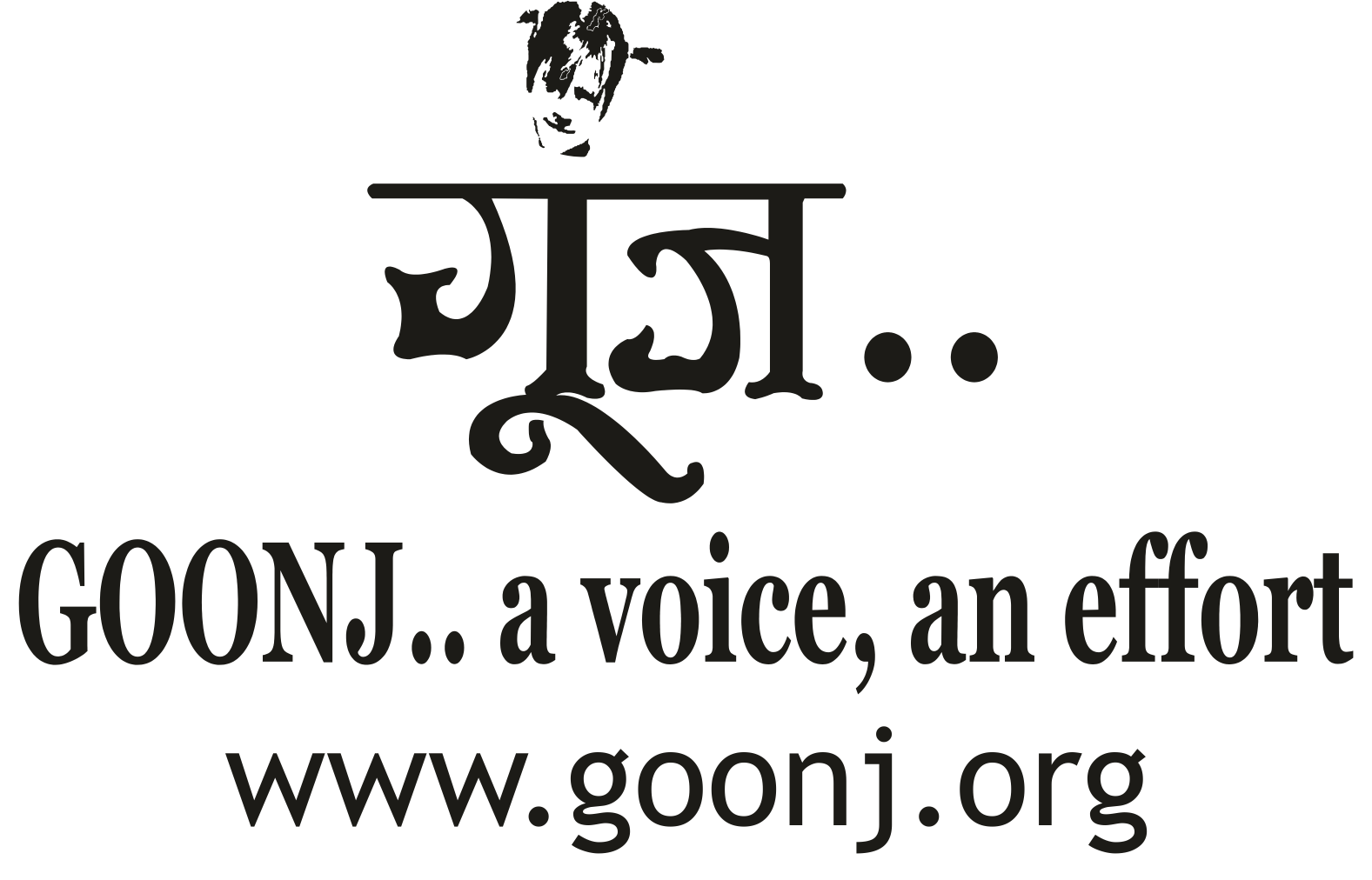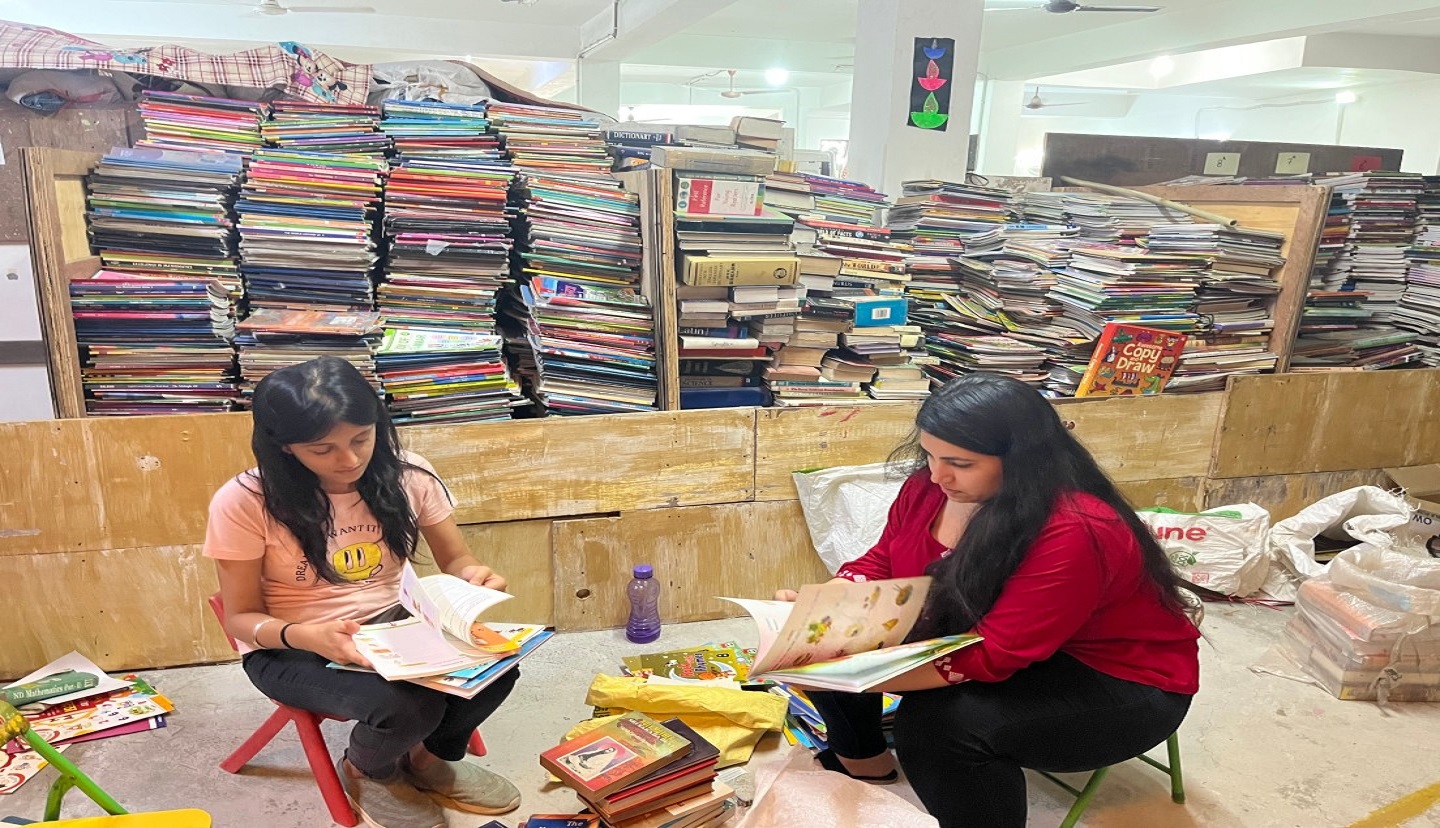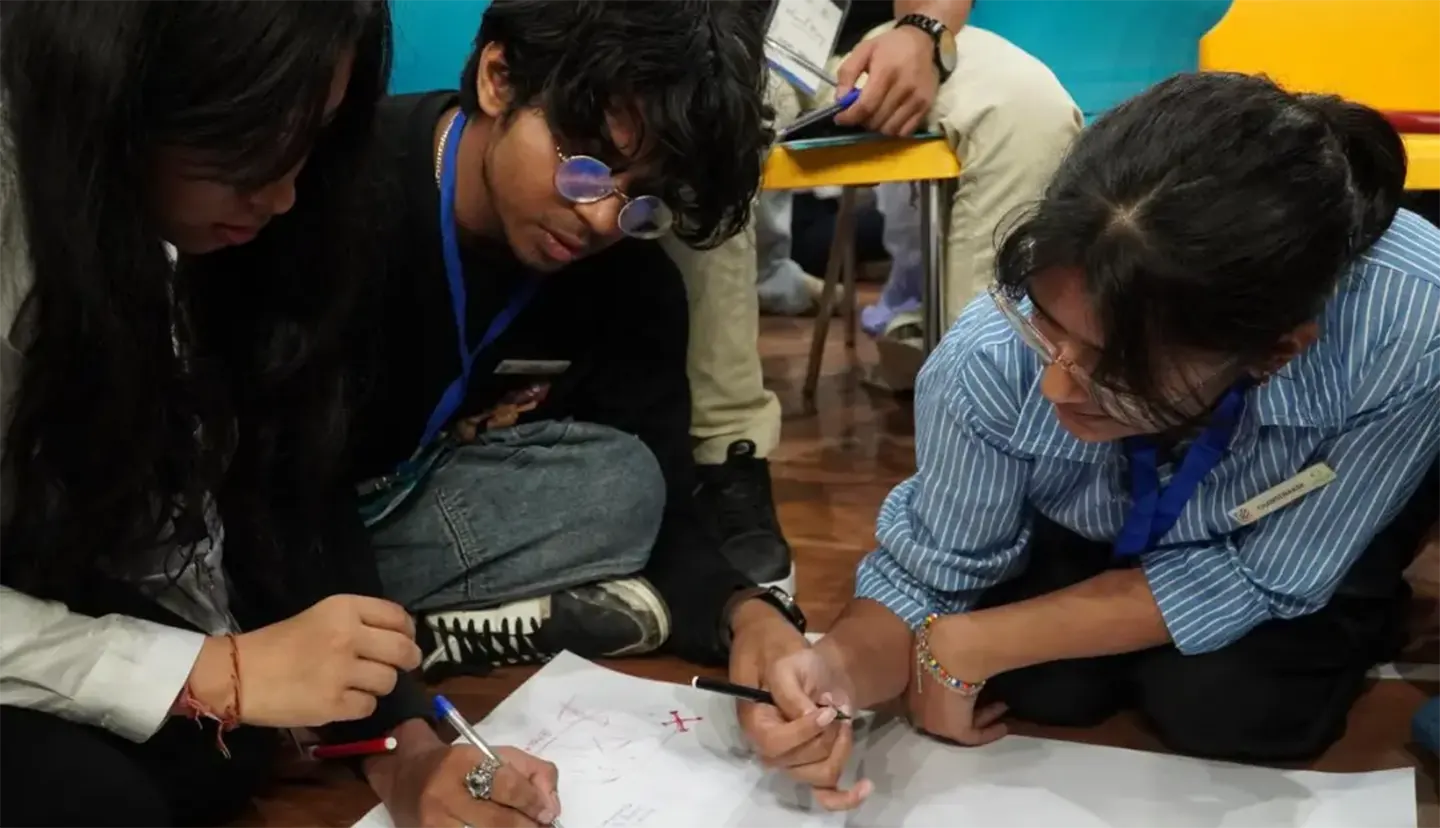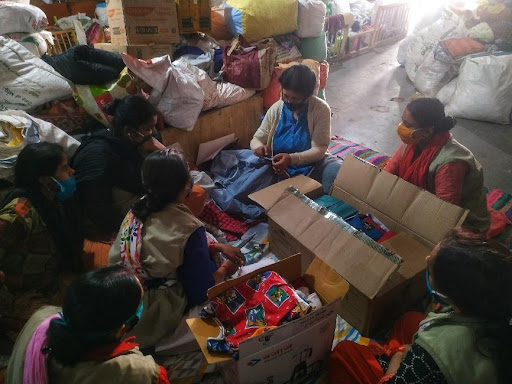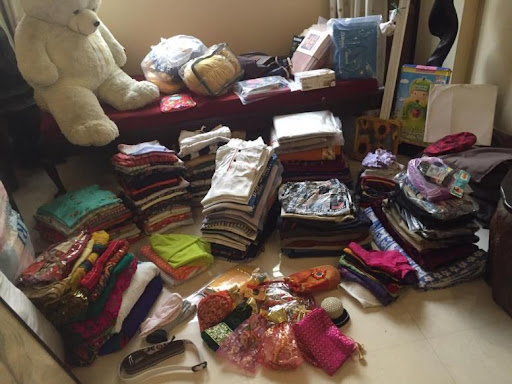General
Q: What does GOONJ do?
Ans: GOONJ is channelising the unused material lying idle in urban homes, to the far-flung villages of India as an important economic resource. Although we deal with all kinds of underutilized material but the prime focus is clothing, one of the most ignored basic needs of human kind.
Q: How was GOONJ formed? Who formed it and why?
Ans; GOONJ was formed in 1999 by Anshu Gupta, together with his friends from the mass communication background. Anshu Gupta, Founder Director, GOONJ is the head of the organization which is governed by six members governing body. The organization does not believe in a lot of hierarchical layers.
Q: Are you a registered body?
Ans: Yes, GOONJ is registered under Societies Act. It is also registered for exemption under section 80 G, 12 A and for foreign contributions- under FCRA.
Q: Where all do you have your formal offices?
Ans: GOONJ has its own offices and paid staff in Delhi, Mumbai, Kolkata, Bangalore, Hyderabad, Chennai, Rishikesh & Patna.
About Volunteering and Internship
Q: How can I volunteer with GOONJ?
Ans: Anyone irrespective of age, gender, education, nationality can volunteer with GOONJ in many different ways, even sitting at home. Visit our website https://goonj.org/volunteer-intern/for a list of volunteering opportunities, write to us at [email protected] or call up the GOONJ office (011- 41401216,26972351) to find out what suits your circumstances.
Q: Do I have to pay any membership fee to become your member/ volunteer?
Ans: No, there is no membership fee for joining GOONJ. Anyone anywhere can become a member by joining our work in different capacities.
Q: If I want to open a dropping center at my place what is the procedure?
Ans: If you are in the cities where we have our own operations you can get in touch with our regional offices to find out more about setting up a dropping center.
Write to us on [email protected]
Q: Will I get a certificate, if I volunteer with GOONJ?
Ans: On request we will surely issue a certificate for the work and duration of time that a person volunteer with GOONJ on the tasks assigned by us. On the other hand we strongly discourage people from approaching us with requests from their friends, relatives, children, college kids wanting a certificate when they are not actually interested in working with us as a volunteer.
Q: I want to join you formally, how do I do that?
Ans: Send us your details and whenever there is an opening we will get in touch with you but if you are keen on working with us then the best way is to start with doing voluntary work with us. That will give you a first hand idea about our work, our work culture etc. Send us your detailed resume on [email protected] for future reference.
Q: I want to do my internship, how do I proceed?
Ans: Please ask your institute to send us a formal letter, mentioning about your interest in doing an internship with GOONJ. Also, please mention the duration, specific interest area, geographical preference. Clear and detailed information from your side will help us revert back at the earliest.
Q: Can I be a part of your distribution or can I travel with you in the villages?
Ans: You are most welcome to travel with our team members when they go on field visits but a) you will have to work according to their schedule b) the facilities and the living conditions at the villages are the most basic, so be prepared for some rough living. Let us know about your free dates and if there is someone traveling at that time, we will let you know.
Finances and Funding
Q: How do you raise funds for regular functioning?
Ans: GOONJ manages its funds through income from three different sources.
- Self-generated income from various fund raising activities like sale of old newspapers, Team 5000, through sale of products from recycled material or sponsorships.
- Individual donations: from people who have gone beyond giving us their material only and understood the fact that we also need money to manage the entire logistics of reaching material from cities to the villages.
- Corporate/Institutes/Retails: contribute to Goonj general funds or partner with us on specific project.
- Funding from funding agencies: from time to time we get funding limited to certain projects or for certain duration.
Q: How do I make monetary contribution to GOONJ?
Ans: Here are some options below to contribute;
- For Direct/Online Contribution – click here
- You can also make a cheque / draft in the name of GOONJand send to GOONJ, J-93, Sarita Vihar, New Delhi-110 076, Tel.- 011-41401216.
- For receipt purpose, please send your name, amount, email ID, tel no. and address to [email protected] , with date & mode of transfer, transfer code/ cheque number, Bank’s name and location with last 4 digits of your account number.
Q: Why do you need monetary support?
Ans: The entire operation is a huge logistical exercise; where money is needed for expenses on transportation, storage space, and manpower for sorting, packing etc, office expenses and team salaries.
Q: How much tax exemption will I get for my monetary contribution to GOONJ?
Ans: 50 % rebate.
Q: Can you tell me how exactly my money has been utilized & for what purpose?
Ans: All the contributions we get go into a big pool of funds we have for carrying on our activities. It is thus difficult to specify the exact utilization of each person’s contribution. You can however get all information about our work, where all we are working, what activities are happening, what is the impact. An easy way to find that out is to refer our newsletters. If you would like to get these quarterly newsletters, please let us know at [email protected] . You could also refer to our Annual Reports.
Q: If I want to send money by cheque/draft, in whose name shall I make the cheque?
Ans: All donations should be made in the name of GOONJ. Please make sure you get the receipt for the same and also please give us your details (Pan no, name, address, email id, contact no) at the time of making the contribution. We need this information as a statutory requirement under the law.
Q: How do I organize collection in my office/colony/schools.. What kind of support GOONJ will provide to initiate the collection?
Ans: First please talk to us about what exactly do you want to do including the basic information, what, where, how, when, why. Once we have the basic information we can guide you on what steps need to be taken before initiating a collection drive. If need be we will also provide you leaflets for local publicity and manpower. Organizing a collection drive may sound like a simple enough thing, but having done it consistently for the last many years, trust us that we know where the usual bottlenecks come up. We want your collection drive to be a big success, it not only helps us, it encourages more people to take up this kind of initiative.
Q: What is the list of material that you take ?
Ans: Clothing is one of the three basic needs (out of food, shelter and clothing). It not only symbolizes a person’s dignity but also offers a protection against the elements. While there are more than 100 issues being talked about in the development sector, right from domestic violence to global warming, this basic need doesn’t find a mention anywhere. GOONJ wants to make clothing a matter of concern as an important issue. In addition, we also encourage people to contribute other household items like stationery, toys, utensils. Please refer to https://goonj.org/material/
Q: What are various Initiatives that GOONJ is involved with?
Ans: With its primary focus on channelizing resources from the cities to the villages, GOONJ works on following programmes :
- Cloth For Work
- School to School
- Not Just a Piece of Cloth
- Rahat
- Green by Goonj
Q: How do you ensure that material will reach the needy people?
Ans: We have extensive and detailed feedback system, where we know even details like which village, which person got what clothes. We back up these reports with personal visits to talk to the village people directly, to get first hand insight.
Q:I have heard people don’t accept old/ second hand material in the villages, how do change this mindset/ how far this is true?
Ans: People in the far flung villages of India, live a very different life than our’s. They do accept old second hand material but we need to give it with respect and dignity and according to what they need. As Anshu Gupta, GOONJ’s Founder Director often says, we always give what we have. We never give what people actually need. This is main reason for all the media stories one reads about disaster struck people during Tsunami, earthquake, floods etc about piles of clothes lying on the roads. Do consider that if a person in a village is wearing a pant and a shirt; a new pant is no less than 100-150 Rs same goes for a shirt. Now a person who struggles hard for two square meals, couldn’t possibly afford that. So obviously it is coming from a second hand clothes market only..
Q: How does the material reach the poor in far-flung areas and how do you ensure it reaches the most deserving?
Ans: The material given by people in the cities comes to the Goonj Centre of Circularity (GCOC) center in that city. Here it is sorted and packed according to various criteria like, age, gender, wearable, un-wearable, woolen etc. Then based on the requirement expressed by the rural partner groups the material goes to different parts of the country by transportation trucks. The partner groups receive it and further distribute it among their communities.
Q: Do you work for women?
Ans: Cloth is a universal basic need irrespective of age groups or gender. Specifically our programme, ‘Not just a piece of cloth’ addresses a basic but taboo need of a woman i.e. clean cloth sanitary napkins for menses. Our napkins are made out of the un-wearable cotton cloth we get after sorting all the wearable cloth. These are strips of clean cotton cloth bunched together in packs. Use of rags/any dirty cloth due to lack of awareness about the health risks involved and scarcity of spare cloth leads women to various infections and diseases. The clean cloth napkins are an entry point to generate more awareness on the related health and hygiene issues. The use of cloth; a material most village women are comfortable and familiar with, coupled with the reuse possibilities makes it a viable option. Refer- https://goonj.org/njpc for more details.
Q: What all states and villages you work with? Do you target specific villages?
Ans: Right now we send material to parts of 23 states of India. Our work is aimed specifically towards the most backward and poor communities in these states like the Mossahari community in Bihar, prawn-farming community in the Sunder Ban delta in West Bengal.
Q: Do you work with Kids?
Ans: We work with rural and urban kids under our School to School programme. S2S is about building links between these two similar yet very different groups to help channelize school material and resources to the resource starved rural school children. The biggest plus for the urban children is that they learn the important lesson of resilience and determination in the face of immense adversity, from their rural counterparts. The programme also exposes them to the realities of the majority of India, something they are completely isolated from. Refer to School to School for more details.
Q: Why target only Rural Areas, the situation is equally grim closer home; in the city slums?
Ans: Our focus on the most far-flung villages comes from the understanding that these are the most neglected, resource and opportunity starved pockets.
Q: How do you build up partnership in the villages?
Ans: Having sound and credible organizations with a strong connect with their communities is a critical part of the entire process. We use multiple means to identify organizations; media reports, local references, Ashoka Fellows network across India, our present network of partner groups, personal visits etc. The partner list is a dynamic document that we keep evaluating constantly based on their programme implementation, feedback reports, field visit reports etc.
Q: How do you check the credibility of the NGOs?
Ans: Please refer the earlier answer.
Q: Do you charge people in the villages in exchange for material?
Ans: No, GOONJ doesn’t charge people anything for the clothes and other material BUT it’s not given free as well. Under the Cloth for Work initiative people who need the material work on their own community issues and get cloth as a motivation.
Giving material to GOONJ
Q: What all can I give/contribute?
Ans: You can give more or less anything, which is not being used at your home, office or community and could be of use to another. We take clothes, household items, stationary, old news papers, one side used paper, furniture, bedding, export surplus, generators, medicines, dry ration, blankets etc. You can refer to the suggestive list of material and certain dos and don’ts around giving. And for specific queries please check with us before sending any material which is not mentioned here.
Q: How do I know what you do with my material?
Ans: Our first request to anyone who wants to give material is that you should first visit our Goonj Centre of Circularity (GCOC) centers to see how we work. You can visit our Goonj Centre of Circularity (GCOC) centers in Delhi, Mumbai, Bangalore, Hyderabad and Kolkata. Call up our offices to fix a time to visit us.
Q: Can you pick up material from home, office, school or college etc.
Ans: As a policy we don’t pick up material from individual homes. There are dropping centers in some parts of the cities where we work. You can go and give material at a center close to you. In case of schools, colleges, other institutions and corporates, since they have the means and the access to their own transportation, we request them to consider the dropping of material as the organization’s contribution towards our work. Transportation- inter and intra city, is one of the biggest costs in our work.
Q: I have heard that you also take old newspapers and other waste papers like magazines, brochures, and one side used paper etc. What do you do with these things?
Ans: The old newspapers are either turned into paper bags of different sizes or sold to raise funds for our work. The one side used paper, brochures, magazines etc are used for making notebooks for rural kids and writing pads.
Q: Will you issue an acknowledgement of material I contribute?
Ans: We will issue an acknowledgement for material received but cannot give specifics of the material i.e. how many clothes, how many shirts etc. Since we get material in big quantities everyday, we feel it will be a waste of precious limited manpower and resources. On the other hand if you provide details of material you give, we will be happy to acknowledge that.
Q: If I contribute in kind will I get a receipt?
Ans: Please refer earlier answer.
Q: Will I get tax exemption on my contribution in kind?
Ans: Under the Indian government rules you won’t get any tax exemption on material contribution.
Q: If I pay you for the transportation, will you be able to send someone for pick up?
Ans: If we know of a transporter who will pick up your material and bring it to our Goonj Centre of Circularity (GCOC) center, we will let you know his details and you can talk to him directly about the charges etc.
Q: Are you active in Delhi slums?
Ans: We provide material to many Delhi and NCR based NGO’s who are working with slum communities.
Q: Can you give me the feedback regarding whereabouts of my material?
Ans: Since we are dealing with vast quantities of material it is impossible for us to say where exactly each individual’s material has gone. What we can tell you is where all did we send material in the last month or last 3-6 months.
Q: What will GOONJ do with this material?
Ans: GOONJ has been reaching material to parts of 23 states of India. People get this material not as charity or Daan, they work on their community issues and get the material as motivation. Schools have been built, wells have been dug up, and bridges have been built by people under the Cloth for Work initiative. Essential school material reaches children in the far-flung village schools under our School to School programme. Rural women are getting the most basic need of a sanitary napkins under our clean cloth sanitary napkin initiative Not just a piece of cloth.
Q: How do you identify the village level partner groups?
Ans: Having sound and credible organizations with a strong connect with their communities, is a critical part of the entire process. We use multiple means to identify organizations; media reports, local references, Ashoka Fellows network across India, our present network of partner groups, personal visits etc. The partner list is a dynamic document that we keep evaluating constantly based on their programme implementation, feedback reports, field-visit reports etc.
Q: Can you distribute material in my area?
Ans: Before we distribute material in any area we need to get basic details of the recipients. Also since we give material under Cloth for Work initiative, we need to partner with a local organization who can connect with the community and bring them together for doing community work. In case of school material or for disasters we still need to know basic information like how many people, age groups, male/female etc details. If you can provide these details and identify a credible local organization willing to take up the initiative, why not?
Q: How & where will you be utilizing the material?
Ans: The material will be provided to people in the far-flung villages of India under our programmes Cloth for Work, School to School, RAHAT and ‘Not Just A Piece of Cloth’ to parts of 23 states of India. For specific details, please refer-www.goonj.org
Q: Can I come with you in the villages where you are working?
Ans: You are most welcome to travel with our team members when they go on field visits but a) you will have to work according to their schedule b) the facilities and the living conditions at the villages are the most basic, so be prepared for some rough living. Let us know about your free dates and if there is someone traveling at that time, we will let you know.
